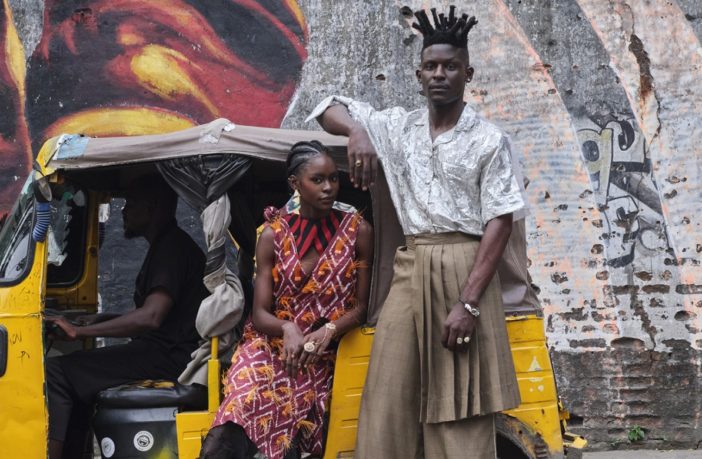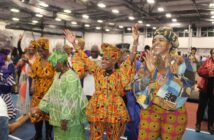“Traditional handwoven textiles such as aso oke and akwete have seen sustained favor in contemporary fashion, while locally made adire cloth has experienced resurgences in popularity.”
At the 2022 edition of GTCO Fashion Weekend in Lagos–GTBank’s annual two-day fashion expo–a selection of fifteen designers, both local and international, took to the runway with their latest collections, each with its own identity and curatorial approach. Individually, each showcase was a feast for the eyes, but seen in succession, these runway shows served as an apt illustration of the heterogeneity Google’s search algorithms have yet to account for.
The truth is, over the years ankara fabrics, which are primarily Dutch imports, have become decreasingly prominent on Lagos’ high fashion runways. Meanwhile, traditional handwoven textiles such as aso oke and akwete have seen sustained favor in contemporary fashion, while locally made adire cloths (tie-dye), batik (wax-dye) and other artisanal creations have experienced resurgences in popularity.
Davou wears a David Tlale beaded top. Photo by Keith Major for EBONY Media.
As global interest in African fashion continues to grow, more and more people have become aware of the industry’s capabilities beyond its more clichéd expressions. Meet four African designers at the forefront of this movement.
Fashion is all about conversation, and Ghana/U.S.-based label Studio 189 is one brand that has plenty to say. Launched in 2013 by Ghanaian-born Abrima Erwiah and co-founder Rosario Dawson, social change has always been at the heart of the brand, whose made-in-Ghana ready-to-wear pieces celebrate family, heritage and community.
No strangers to kente cloth, the famous fabric forms the basis for several of Studio 189’s standout pieces. Their SS23 collection showcases the versatility of kente, as its most well known, yellow varieties are used sparingly in favor of alternate colorways.
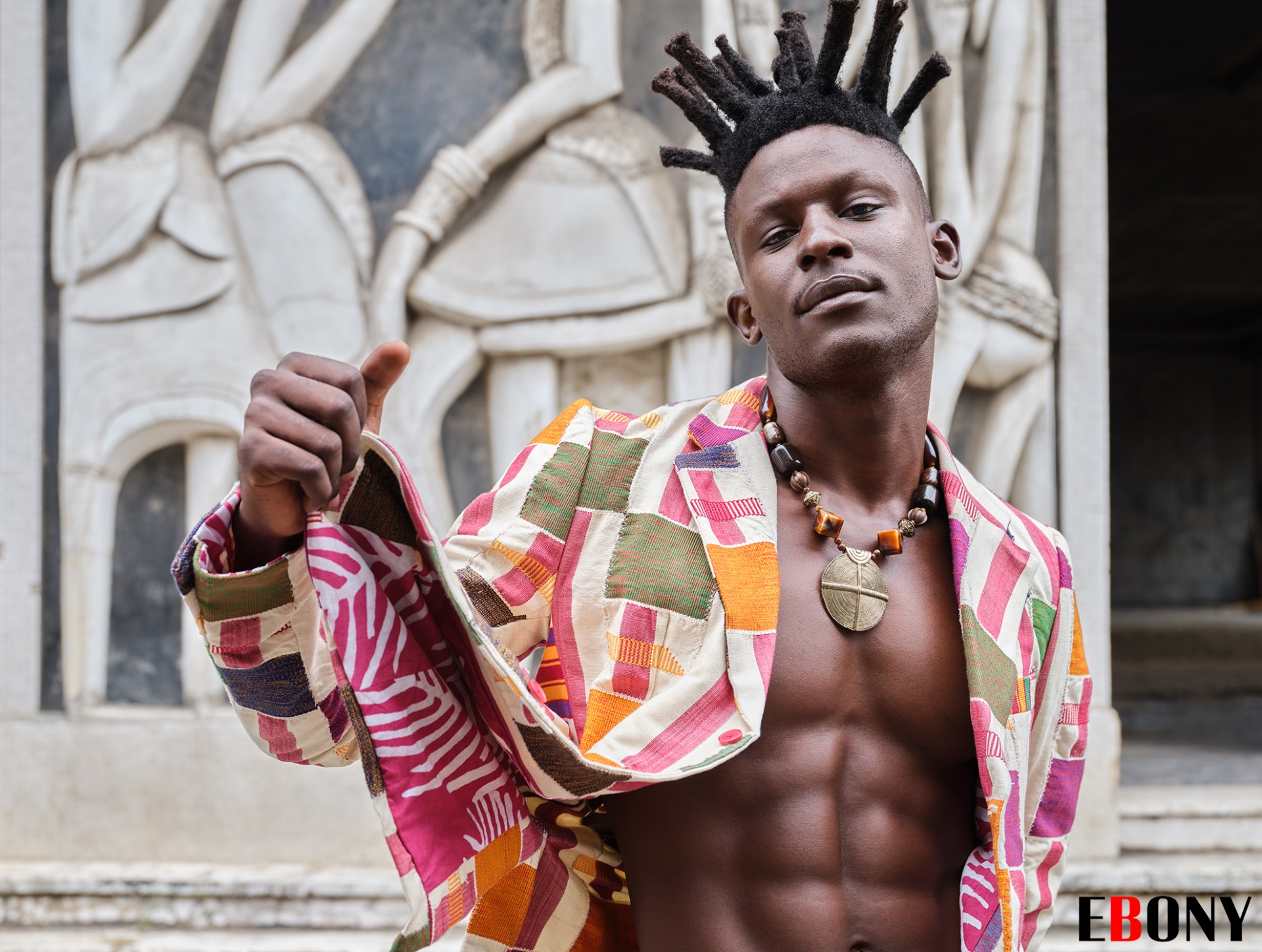
Davou wears a Studio 189 blazer and ARIÁBA jewelry. Photo by Keith Major for EBONY Media.
Aside from the popular textile, every cloth in the collection tells a story of its own, as homegrown cottons are met with low impact dyes to create a multi-sensory, technicolor experience in classic Studio 189 fashion. The design duo also used the new season to remind their audience of their expert mastery of layering, with mismatched prints and patchwork pieces made from contrasting fabrics carved into a range of fun and playful silhouettes.
“Fashion is political, and designers, like politicians, can wield their influence to address societal concerns, or turn a blind eye to the injustices around them.”
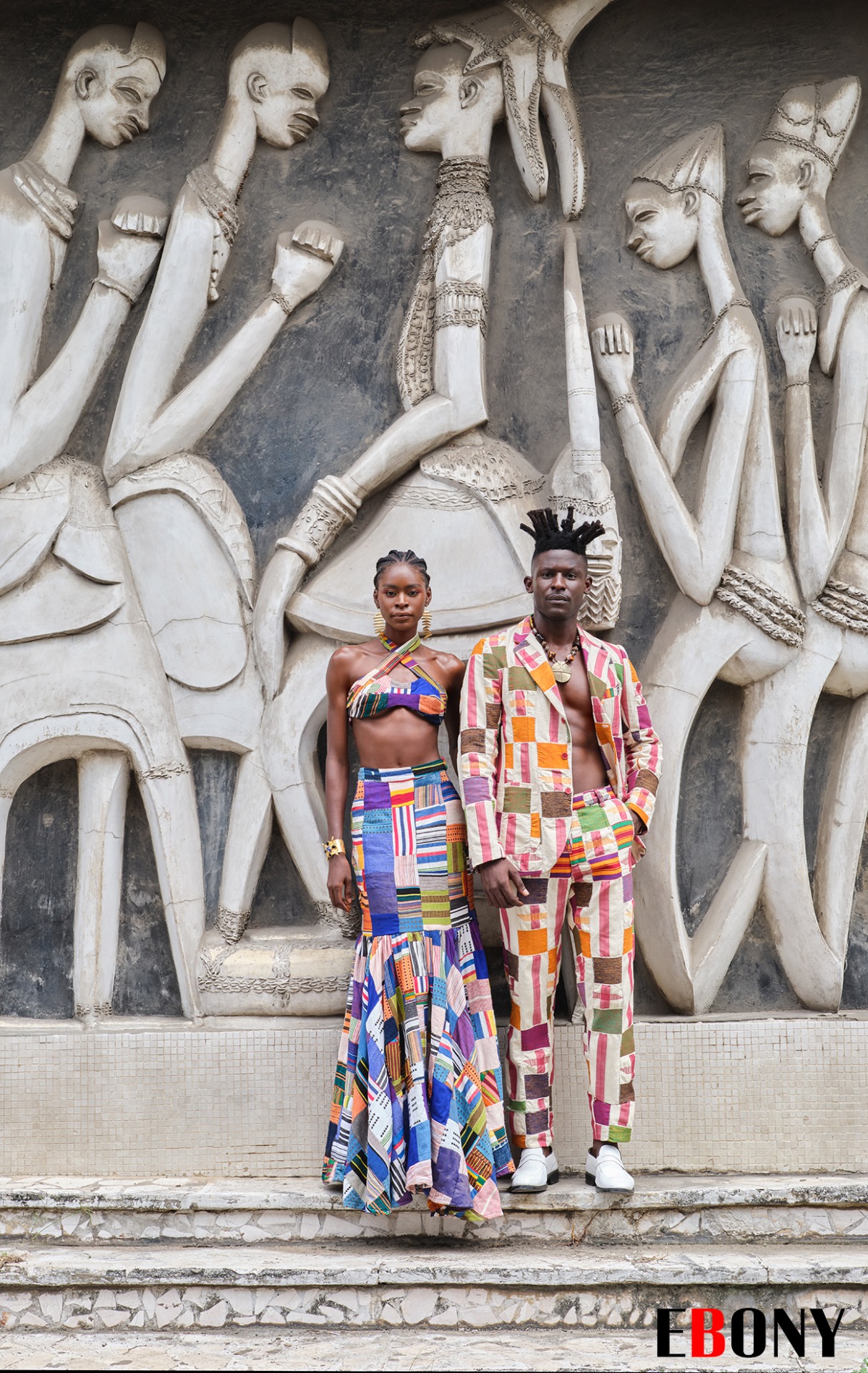 Rebecca wears a Studio189 top and skirt and ARIÁBA jewelry. Davou wears a Studio 189 suit, ARIÁBA jewelry, and Stylist’s own shoes. Photo by Keith Major for EBONY Media.
Rebecca wears a Studio189 top and skirt and ARIÁBA jewelry. Davou wears a Studio 189 suit, ARIÁBA jewelry, and Stylist’s own shoes. Photo by Keith Major for EBONY Media.
Beyond the clothing itself, Studio 189 champions personhood and authenticity above all else. At GTCO Fashion Weekend 2022, the designers invited their models to abandon fashion’s trademark stoicism, and instead, smile and dance their way down the runway. Over the years, this curatorial quirk has become a staple for the brand, whose runway shows are always upbeat, lighthearted and convivial. While it certainly defies runway conventions, there is no doubt that in what can often feel like a pool of monotony, Studio 189 is a breath of fresh air.
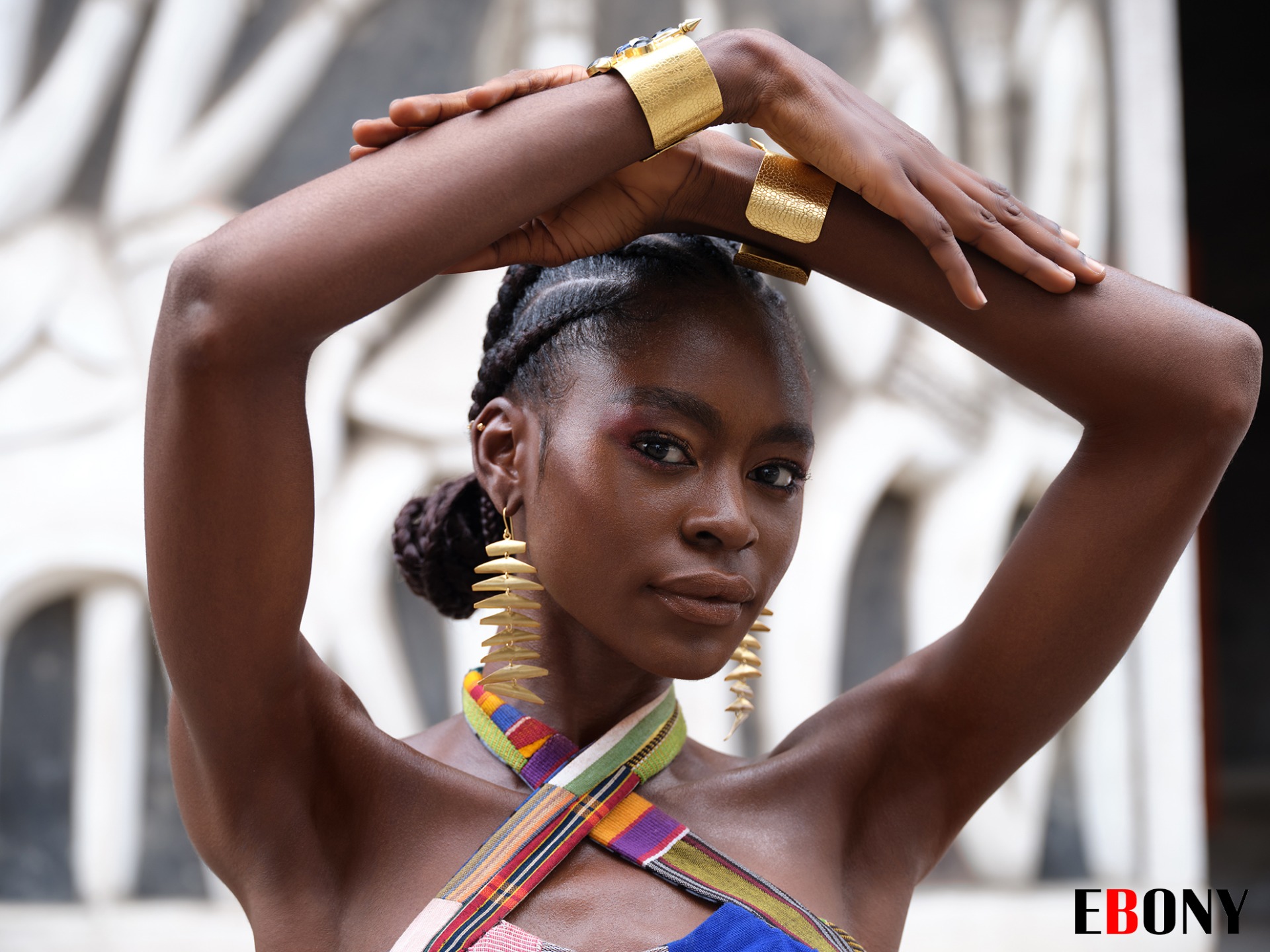 Rebecca wears a Studio189 top and ARIÁBA jewelry. Photo by Keith Major for EBONY Media.
Rebecca wears a Studio189 top and ARIÁBA jewelry. Photo by Keith Major for EBONY Media.
While Nigeria is widely regarded as the leading fashion destination in Africa, its status as such is rivaled only by South Africa, a country that has produced what can only be described as an onslaught of remarkable design talents over the years. Among their best and brightest is Johannesburg-born designer, David Tlale, whose stellar designs have thrilled audiences at fashion weeks all over the world, from Paris to New York, and of course, Lagos.
“David Tlale’s namesake brand is a unique take on luxury–one that is rooted in the designer’s South African heritage, but with a cross-cultural vision and sensibility.”
David Tlale has a distinct fashion philosophy, combining fluidity, modernity and sensuality to create timeless and evocative pieces. The brand is a unique take on luxury–one that is rooted in the designer’s South African heritage, but with a cross-cultural vision and sensibility. Tlale launched in 2003 and by 2009 he was awarded the Fashion Designer of the Year award at the Africa Fashion Awards in Johannesburg. Since then, he’s built a reputation as one of industry’s most reputable players.
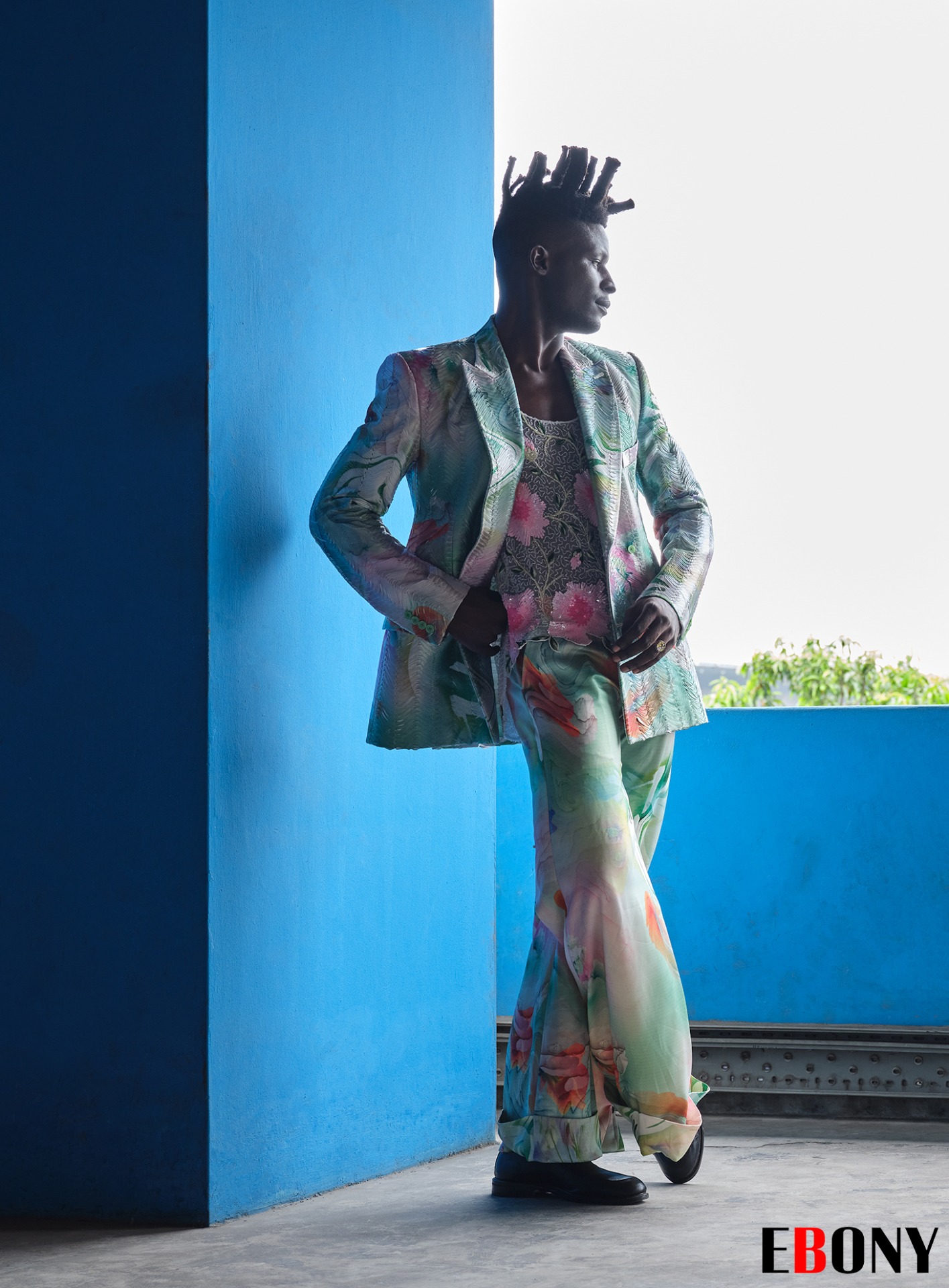
Davou wears a David Tlale suit and beaded top, and Stylist’s own shoes. Photo by Keith Major for EBONY Media.
Tlale’s prints easily stand out against his contemporaries, as shown by his latest collection. While the designer’s standout color for Spring/Summer 2023 is green (which appears throughout the collection in a variety of shades), pink, white and yellow hues also come effortlessly into play, evoking a sense of youthfulness and nostalgia while creating patterns and colorways that are distinctly David Tlale. It’s the perfect marriage of color and texture, but with that extra layer of craftsmanship that makes every wearer feel like his muse.
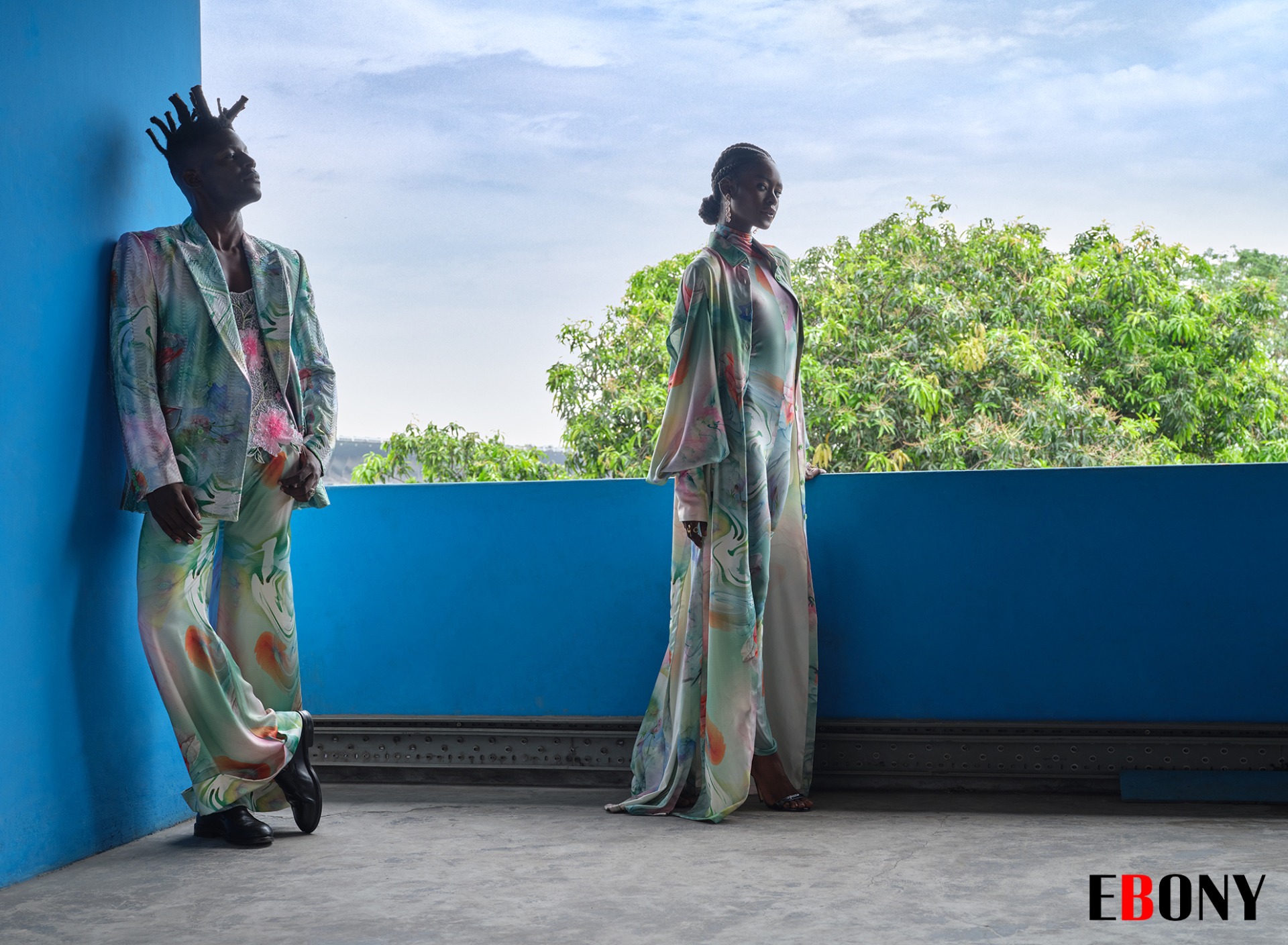 Davou wears a David Tlale suit and beaded top, and Stylist’s own shoes. Rebecca wears a David Tlale shirtdress and bodysuit, ARIÁBA jewelry, and Stylist’s own shoes. Photo by Keith Major for EBONY Media.
Davou wears a David Tlale suit and beaded top, and Stylist’s own shoes. Rebecca wears a David Tlale shirtdress and bodysuit, ARIÁBA jewelry, and Stylist’s own shoes. Photo by Keith Major for EBONY Media.
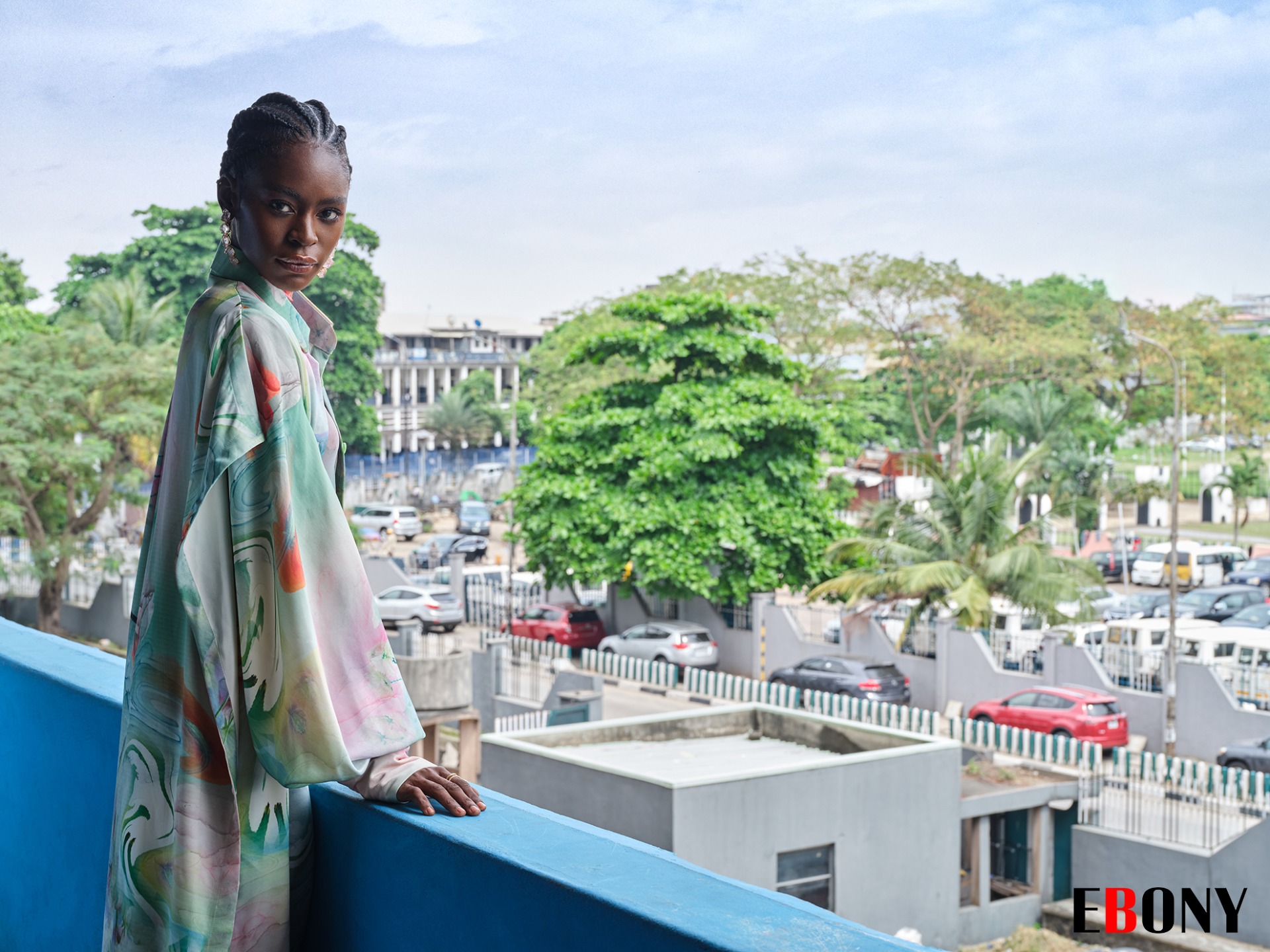 Rebecca wears a David Tlale shirtdress and bodysuit and ARIÁBA jewelry. Photo by Keith Major for EBONY Media.
Rebecca wears a David Tlale shirtdress and bodysuit and ARIÁBA jewelry. Photo by Keith Major for EBONY Media.
PEPPER ROW
If movement and structure are constantly at odds with one another, few tread the line between the two more artfully than Lagos-based Pepper Row. Founded by Omafume Niemogha in 2018, Pepper Row has fashioned dozens of unique silhouettes, creating pieces as colorful and diverse as the city whose spirit they embody.
Niemogha works with local artisans to create original patterns and textiles, ranging from handwoven aso oke textiles to plant-dyed adire fabrics. These are then used to create fun and functional, wearable art pieces made with zero-scrap waste. For Spring/Summer 2023, Pepper Row revised many of the elements that have come to define the brand, from multicolored, striped garments to their signature raffia detailing.
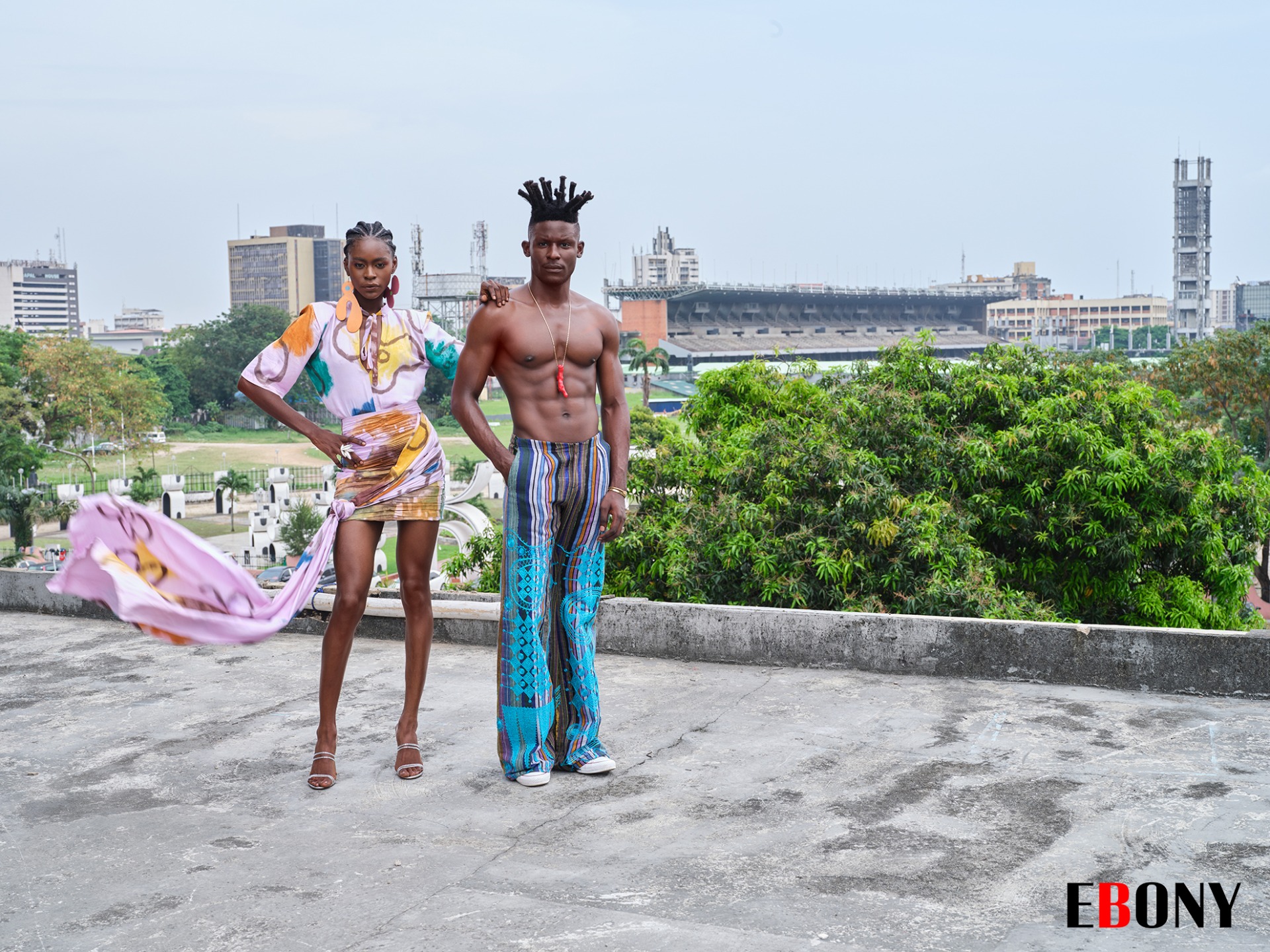 Rebecca wears a Pepper Row dress and earrings, an ARIÁBA ring, and Stylist’s own shoes. Davou wears Pepper Row pants, an ARIÁBA necklace and Stylist’s own shoes. Photo by Keith Major for EBONY Media.
Rebecca wears a Pepper Row dress and earrings, an ARIÁBA ring, and Stylist’s own shoes. Davou wears Pepper Row pants, an ARIÁBA necklace and Stylist’s own shoes. Photo by Keith Major for EBONY Media.
At GTCO Fashion Weekend, Niemogha’s models walked to the beat of Fela Kuti’s ‘Let’s Start,’ a Yoruba-infused record whose beat and pentatonic melodies were a call back to decades-past. Pepper Row reimagines and recontextualises traditional elements for a contemporary audience, lending a new voice to existing conversations around cultural preservation and sustainable design practices in the process.
Fashion is political, and designers, like politicians, can wield their influence to address societal concerns, or turn a blind eye to the injustices around them. Every fashion week in Lagos, creative director Frank Aghuno seems to pose a fundamental question: What is fashion’s place in a society marred by class inequality, gender-based discrimination and a plethora of other social ills? Furthermore, how can fashion capture the pulse of a generation eager to tackle these issues in their day-to-day lives?
“What is fashion’s place in a society marred by class inequality, gender-based discrimination and a plethora of other social ills?”
Fruché is his response–a brand whose aesthetic qualities serve as a magnet that draws its viewers into a sea of social commentary. For Spring/Summer 2023, Aghuno conceived his collection, titled ‘See Finish,’ as an homage to the Niger Delta, his ancestral home, where he found inspiration in the shirt dresses and traditional wraps worn by men, which call for a re-evaluation of our conceptions of gendered clothing.
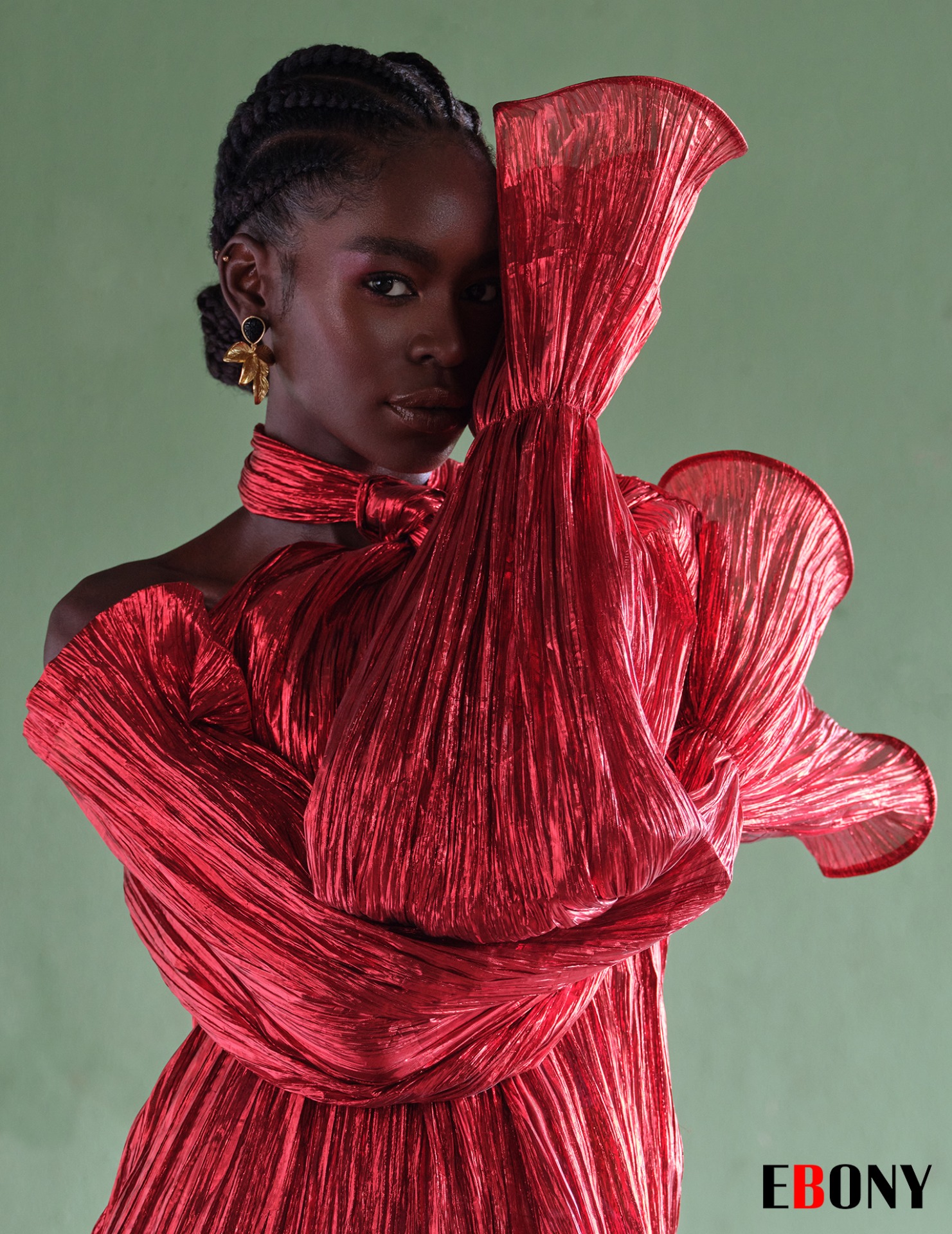
Rebecca wears Fruché top and ARIÁBA jewelry. Photo by Keith Major for EBONY Media.
However, this is just the tip of the iceberg. Fruché stretches symbolism to the highest level, telling stories about colonialism, pollution, inequality and migration via potent visual cues, communicated through his choices of fabrics and textiles. Upcycled denim and ‘Ghana Must Go’ nylons interact with aso oke, silk and organza, creating an unparalleled visual universe that invites close inspection. Through this medium, Fruché holds a mirror up to society and urges us to look inward.
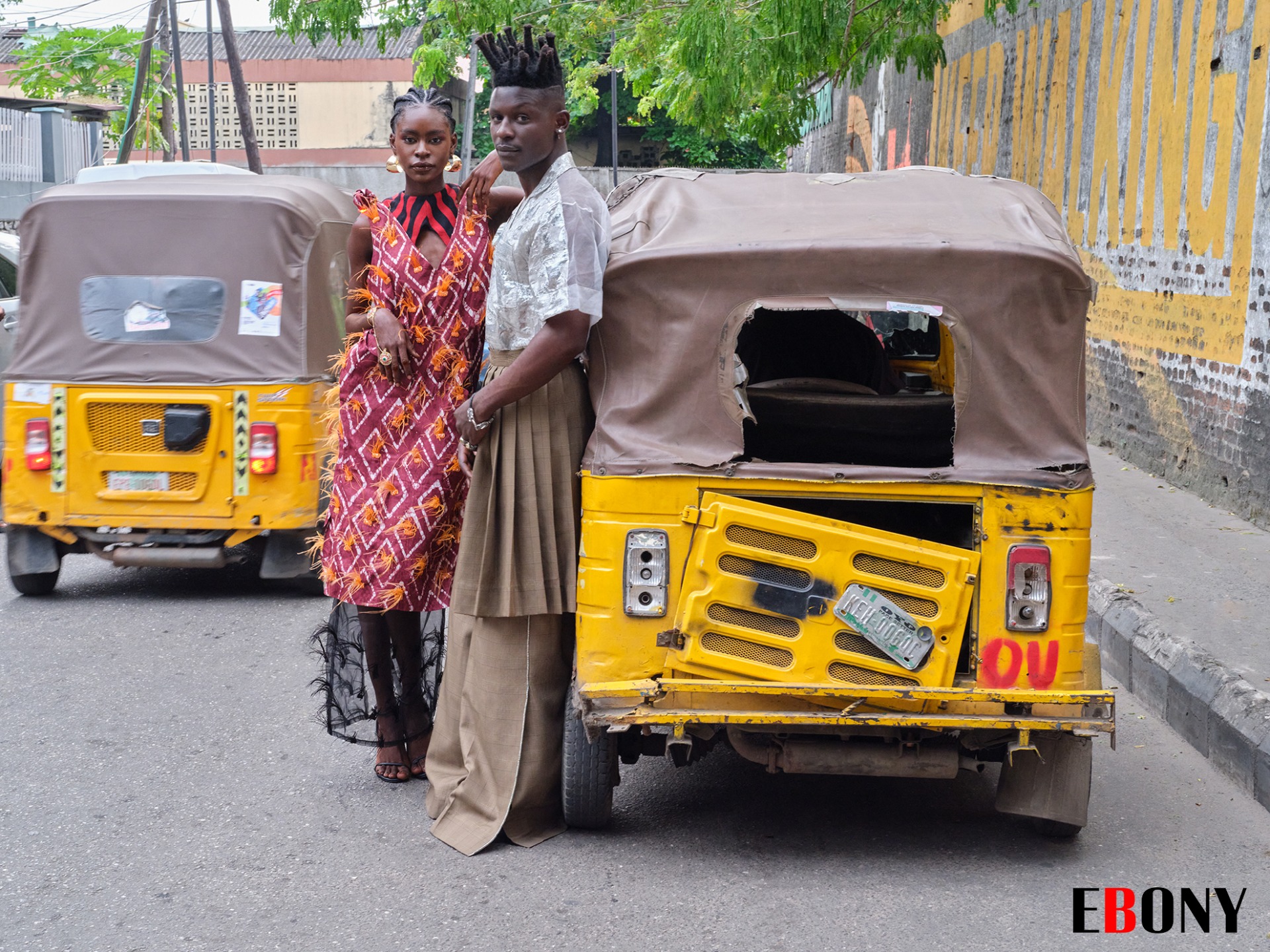 Rebecca wears Fruché dress and slip, ARIÁBA jewelry, and Stylist’s own shoes. Davou wears a Fruché shirt and pants, and ARIÁBA jewelry. Photo by Keith Major for EBONY Media.
Rebecca wears Fruché dress and slip, ARIÁBA jewelry, and Stylist’s own shoes. Davou wears a Fruché shirt and pants, and ARIÁBA jewelry. Photo by Keith Major for EBONY Media.
PHOTOGRAPHY CREDITS
PHOTO DIRECTOR / PHOTOGRAPHER KEITH MAJOR
PRODUCER ENIAFE MOMODU
STYLIST MOSES EBITE
MODELS REBECCA FABUNMI, DAVOU PWAJOK
MAKEUP ARTIST DAVID ONYEDIKE
PHOTO ASSISTANT TAIWO ARIFAYAN
PRODUCTION ASSISTANT ODAFE UBOH
STYLING ASSISTANT PROVIDENCE OZIC
BTS PHOTOGRAPHER OJ MAYANA
VIDEO CREDITS
PRODUCER ENIAFE MOMODU
ASSISTANT FILM DIRECTOR TSEYINMI OMATSEYE
DIRECTOR OF PHOTOGRAPHY MIRET “EMSY’ LONGCHI
FIRST ASSISTANT CAMERA EDWARD IKPAT
SECOND ASSISTANT CAMERA ADETUNJI ADEDAPO
THIRD ASSISTANT CAMERA / DRONE PILOT TRANKGOD EYEREGBA
PRODUCTION ASSISTANT OLUKAYODE AKINBORO
VIDEO EDITORS MIRET “EMSY” LONGCHI, OLUWASEUN OBAFEMI
COLOR GRADING EDWARD IKPAT
SOUND EDITOR GCLEF
